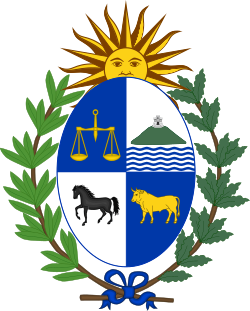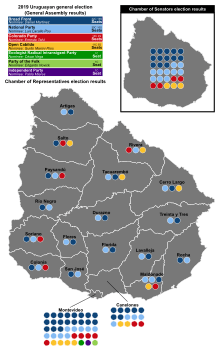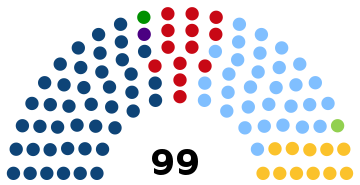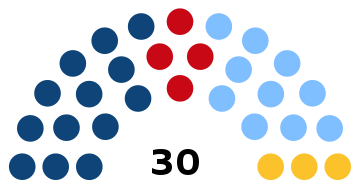Elections in Uruguay
Uruguay elects on national level a head of state - the president - and a legislature.
 |
|---|
| This article is part of a series on the politics and government of Uruguay |
|
Executive
|
|
Legislative
|
|
Administrative divisions |
|
|
|
|
See also |
|
|
Presidential elections
The president and the vice-president are elected on one ballot for a five-year term by the people.
Each party must elect its candidates for President and Vice-President in primary elections, which are usually held in June. The selected candidates face the electorate in the general elections in October. If no candidate obtains the absolute majority of votes, there is a runoff between the two most-voted candidates.
Parliamentary elections
The General Assembly (Asamblea General) has two chambers. The Chamber of Deputies (Cámara de Diputados) has 99 members, elected for a five-year term by proportional representation. The Chamber of Senators (Cámara de Senadores) has 31 members elected for a five-year term by proportional representation and the Vice-president.
Uruguay has a multi-party system, with three dominant political parties, with extreme difficulty for anybody to achieve electoral success under the banner of any other party.
Schedule
Election
| Position | 2009 | 2010 | 2011 | 2012 | 2013 | 2014 | 2015 |
|---|---|---|---|---|---|---|---|
| Type | Presidential (October) National Congress (October) Gubernatorial (October) | None | None | Presidential (October) National Congress (October) Gubernatorial (October) | None | ||
| President and vice president |
President and vice president | None | None | President and vice president | None | ||
| National Congress | All seats | None | None | All seats | None | ||
| Provinces, cities and municipalities | None | All positions | None | None | All positions | ||
Inauguration
| Position | 2010 | 2011 | 2012 | 2013 | 2014 | 2015 |
|---|---|---|---|---|---|---|
| Type | Presidential (March) National Congress (March) Gubernatorial (March) | None | Presidential (March) National Congress (March) Gubernatorial (March) | |||
| President and vice president |
March 1 | None | March 1st | |||
| National Congress | February 15 | None | February 15 | |||
| Provinces, cities and municipalities | July 8 | None | July 11th | |||
Latest elections
2019 general election
On 25 November, preliminary results in the runoff election showed Lacalle Pou with a majority (48.71%) by 28,666 votes over Martínez (47.51%), which delayed the announcement of a winner as 35,229 absentee vote needed to be counted.[1][2] Martínez later conceded defeat on 28 November.[2] On 30 November, final votes counts confirmed Lacalle Pou as the winner with 48.8% of the total votes cast over Martínez with 47.3%.[3]

  | ||||||||||||||
| Party | Presidential candidate | First round | Second round | Seats | ||||||||||
|---|---|---|---|---|---|---|---|---|---|---|---|---|---|---|
| Votes | % | Votes | % | Chamber | +/– | Senate | +/– | |||||||
| Broad Front | Daniel Martínez | 949,376 | 40.49 | 1,152,271 | 49.21 | 42 | –8 | 13 | –2 | |||||
| National Party | Luis Alberto Lacalle Pou | 696,452 | 29.70 | 1,189,313 | 50.79 | 30 | –2 | 10 | 0 | |||||
| Colorado Party | Ernesto Talvi | 300,177 | 12.80 | 13 | 0 | 4 | 0 | |||||||
| Open Cabildo | Guido Manini Ríos | 268,736 | 11.46 | 11 | New | 3 | New | |||||||
| Partido Ecologista Radical Intransigente | César Vega | 33,461 | 1.43 | 1 | +1 | 0 | 0 | |||||||
| Party of the Folk | Edgardo Novick | 26,313 | 1.12 | 1 | +1 | 0 | 0 | |||||||
| Independent Party | Pablo Mieres | 23,580 | 1.01 | 1 | –2 | 0 | –1 | |||||||
| Popular Unity | Gonzalo Abella | 19,728 | 0.84 | 0 | –1 | 0 | 0 | |||||||
| Green Animalist Party | Gustavo Salle | 19,392 | 0.83 | 0 | New | 0 | New | |||||||
| Digital Party | Daniel Goldman | 6,363 | 0.27 | 0 | New | 0 | New | |||||||
| Workers' Party | Rafael Fernández | 1,387 | 0.06 | 0 | 0 | 0 | 0 | |||||||
| Invalid/blank votes | 88,399 | – | 91,612 | – | – | – | – | – | ||||||
| Total | 2,433,364 | 100 | 2,433,196 | 100 | 99 | 0 | 30 | 0 | ||||||
| Registered voters/turnout | 2,699,978 | 90.13 | 2,699,980 | 90.12 | – | – | – | – | ||||||
| Source: Corte Electoral, El Pais (First round); Corte Electoral El Pais (Second round) | ||||||||||||||
Past elections and referendums
Local elections
- 2000 Uruguayan municipal elections
- 2005 Uruguayan municipal elections
- 2010 Uruguayan municipal elections
- 2015 Uruguayan municipal elections
See also
- Electoral calendar
- Electoral system
- Ley de lemas
References
- "Elecciones en Uruguay: con el 100% de las mesas escrutadas, ¿cómo terminó la votación?". La Nación (in Spanish). 2019-11-25. Retrieved 2019-11-25.
- "Uruguay election: Lacalle wins presidency as rival concedes". BBC.com. 28 November 2019. Retrieved 1 December 2019.
- "Lacalle won with 48.8% and Martínez obtained 47.3% in the 2019 ballot: look at the results". El Pais. 30 November 2019. Retrieved 1 December 2019.
External links
- Adam Carr's Election Archive
- Political Data Bank at the Social Sciences School - Universidad de la República (Uruguay)
